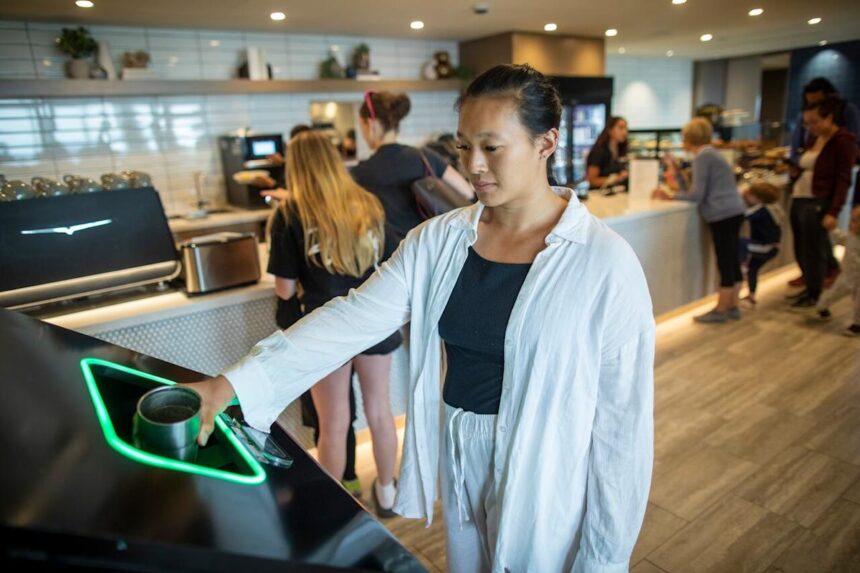On a drizzly Vancouver afternoon, I watched something quietly revolutionary happening at a bustling Commercial Drive café. Diners weren’t tossing containers into the garbage – they were scanning QR codes and dropping their empty bowls into a collection bin.
This small but significant shift represents the growing movement to tackle Canada’s restaurant waste problem, one container at a time.
“We’ve diverted over 100,000 single-use containers from landfills since we started,” says Brianne Miller, founder of Nada Grocery and now a devoted user of Vancouver-based reusable container program Reusables.ca. “The system just works – for businesses and customers.”
Vancouver generates approximately 82 million single-use items annually according to city environmental data, with takeout containers representing a substantial portion of this waste. The city’s Single-Use Item Reduction Strategy has pushed businesses to find sustainable alternatives, creating perfect conditions for innovation.
Enter Reusables.ca, a homegrown startup that’s gaining traction with a simple proposition: what if takeout didn’t create garbage?
The concept works through a straightforward system – customers download an app, scan containers when picking up food, then return them to any participating business within 14 days. The company handles collection, industrial washing, and redistribution to restaurant partners.
“We’re essentially building a mini circular economy for food containers,” explains Jason Hawkins, co-founder of Reusables.ca, during our conversation at their East Vancouver operations centre. “The biggest challenge wasn’t creating the containers – it was building the infrastructure to clean and redistribute them efficiently.”
Their custom-designed containers withstand hundreds of uses and commercial washing cycles – far more sustainable than even compostable alternatives, which require significant resources to produce and rarely get properly processed.
The model echoes similar programs finding success in Toronto, Montreal, and across Europe. A recent Environment Canada study showed reusable container programs can reduce packaging waste by up to 85% in participating restaurants while potentially saving businesses money long-term.
“At first, we were skeptical about costs and customer adoption,” admits Sara Wong, owner of Pho Express on Main Street. “But we’re actually saving about 15% on packaging expenses now, and customers love being part of something sustainable.”
The company has partnered with over 40 restaurants across Vancouver, focusing initially on the dense commercial corridors of Main Street, Commercial Drive, and downtown – areas with high takeout demand and environmentally conscious consumers.
However, challenges remain. Consumer habits are deeply ingrained, and convenience still drives many purchasing decisions. “The biggest hurdle is behavioral change,” says environmental psychologist Dr. Miranda Chen from UBC. “Even environmentally concerned people often prioritize convenience in real-world situations.”
Reusables.ca addresses this through behavioral design – making returns possible at any participating location and implementing a modest container fee that’s refunded upon return, similar to bottle deposit systems that have proven successful across Canada.
The pandemic initially threatened to derail progress as single-use items surged amid safety concerns. However, scientific consensus eventually confirmed that properly sanitized reusable containers pose no additional health risks – in fact, industrial washing processes create a higher standard of cleanliness than many disposable alternatives.
Provincial health authorities have since developed guidelines specifically for reusable container programs, giving businesses and consumers added confidence.
The environmental impact extends beyond just waste reduction. A lifecycle assessment commissioned by Metro Vancouver found that a reusable container must be used between 16-18 times to offset its production footprint compared to single-use alternatives. Reusables.ca reports their containers average 85 uses before being recycled.
“This isn’t just about waste – it’s about energy, water, and carbon footprints across the entire lifecycle,” explains climate policy analyst Jaime Rodriguez. “When you calculate the full environmental cost, reusable systems are dramatically better.”
What’s particularly noteworthy about this Vancouver initiative is how it represents a growing shift in environmental solutions – moving from individual consumer responsibility toward systems-based approaches.
“For too long, we’ve placed the burden of sustainability on individual choices,” says green economy researcher Dr. Amita Gill. “What’s exciting about container programs is they create infrastructure that makes sustainable choices the default option.”
The provincial government has taken notice. BC’s CleanBC initiative recently highlighted reusable container programs as part of its strategy to reduce plastic waste by 80% by 2030.
Financial support has followed, with Reusables.ca securing $750,000 in recent funding from a combination of private investors and Sustainable Development Technology Canada, a federal foundation supporting clean technology.
The company aims to expand to Victoria and Kelowna next year, with plans to develop a franchise model for other Canadian cities. “Every urban centre needs this infrastructure,” says Hawkins. “We’ve proven the model works in Vancouver – now it’s about scaling efficiently.”
For everyday Vancouverites, the experience has been surprisingly seamless. “I was worried it would be complicated, but it’s actually easier than recycling properly,” laughs Michael Tran, a regular user I met returning containers downtown. “Plus, the food stays warmer in these containers than in those flimsy compostable ones.”
As our interview concludes, Hawkins points to a wall map showing potential expansion locations. “Five years ago, people thought this was impossible. Now we’re just figuring out how to grow fast enough to meet demand.”
With Canadians increasingly concerned about waste and climate impacts, Vancouver’s reusable container revolution offers something surprisingly rare in environmental news: a practical solution that’s working right now, not just a distant promise for the future.






